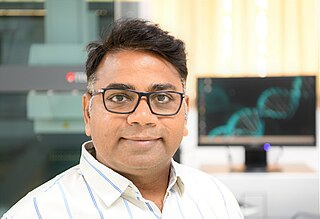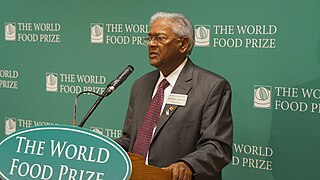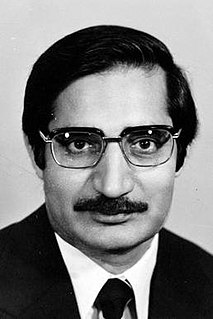Related Research Articles

Agricultural science is a broad multidisciplinary field of biology that encompasses the parts of exact, natural, economic and social sciences that are used in the practice and understanding of agriculture. Professionals of the agricultural science are called agricultural scientists or agriculturists.

The Green Revolution, or the Third Agricultural Revolution, is the set of research technology transfer initiatives occurring between 1950 and the late 1960s that increased agricultural production in parts of the world, beginning most markedly in the late 1960s. The initiatives resulted in the adoption of new technologies, including high-yielding varieties (HYVs) of cereals, especially dwarf wheat and rice. It was associated with chemical fertilizers, agrochemicals, and controlled water-supply and newer methods of cultivation, including mechanization. All of these together were seen as a 'package of practices' to supersede 'traditional' technology and to be adopted as a whole. The key elements of the revolution include: 1) use of the latest technological and capital inputs, 2) adoption of modern scientific methods of farming, 3) use of high yielding varieties of seeds, 4) proper use of chemical fertilizers, 5) consolidation of land holdings, 6) use of various mechanical machineries.

Norman Ernest Borlaug was an American agronomist who led initiatives worldwide that contributed to the extensive increases in agricultural production termed the Green Revolution. Borlaug was awarded multiple honors for his work, including the Nobel Peace Prize, the Presidential Medal of Freedom and the Congressional Gold Medal.

The International Maize and Wheat Improvement Center is a non-profit research-for-development organization that develops improved varieties of wheat and maize with the aim of contributing to food security, and innovates agricultural practices to help boost production, prevent crop disease and improve smallholder farmers' livelihoods. CIMMYT is one of the 15 CGIAR centers. CIMMYT is known for hosting the world's largest maize and wheat genebank at its headquarters in Mexico.

Mankombu Sambasivan Swaminathan is an Indian agronomist, agricultural scientist, plant geneticist, administrator and humanitarian. Swaminathan is a global leader of the green revolution. He has been called the main architect of the green revolution in India for his leadership and role in introducing and further developing high-yielding varieties of wheat and rice. Swaminathan's collaborative scientific efforts with Norman Borlaug, spearheading a mass movement with farmers and other scientists and backed by public policies, saved India and Pakistan from certain famine-like conditions in the 1960s. His leadership as Director General of the International Rice Research Institute (IRRI) in the Philippines was instrumental in his being awarded the first World Food Prize in 1987, recognized as the Nobel or the highest honours in the field of agriculture. United Nations Environment Programme has called him 'the Father of Economic Ecology'.

The World Food Prize is an international award recognizing the achievements of individuals who have advanced human development by improving the quality, quantity, or availability of food in the world. Conceived by Nobel Peace Prize laureate Norman Borlaug and established in 1986 through the support of General Foods, the prize is envisioned and promoted as the Nobel or the highest honors in the field of food and agriculture. It is now administered by the World Food Prize Foundation with support from numerous sponsors. Since 1987, the prize has been awarded annually to recognize contributions in any field involved in the world food supply, such as animal science, aquaculture, soil science, water conservation, nutrition, health, plant science, seed science, plant pathology, crop protection, food technology, food safety, policy, research, infrastructure, emergency relief, and poverty alleviation and hunger.
Catherine "Cathy" Bertini is an American public servant. She is the 2003 World Food Prize Laureate. She was the Executive Director of the United Nations World Food Program from 1992 to 2002. She served as the UN Under-Secretary for Management from 2003 to 2005. Currently she is a distinguished fellow at the Chicago Council on Global Affairs, the Chair of the Board of the Global Alliance for Improved Nutrition (GAIN) and the Chair of the Executive Board of the Crop Trust.
Subrahmaniam Nagarajan is an Indian wheat pathologist. He studied in Chennai till high school and completed his early education at the Agriculture College, Coimbatore, then pursued his masters at the Indian Agriculture Research Institute, New Delhi and received his doctorate in Agriculture from the Delhi University. He is the Project Director of the All India Wheat program and author of more than 120 research papers, 50 book chapters and two textbooks.
Gurdev Singh Khush is an Agronomist and Geneticist who, along with mentor Henry Beachell, received the 1996 World Food Prize for his achievements in enlarging and improving the global supply of rice during a time of exponential population growth.

Abdul Rashid, is a Pakistani agricultural scientist, who has served as Member (Bio-sciences) of Pakistan Atomic Energy Commission (PAEC) from 2008 to 2011 and Director General of Pakistan's National Agricultural Research Center (NARC) from 2006 to 2008. He received a Ph.D. from the University of Hawaii at Manoa, Hawaii, in the United States.
The Borlaug Global Rust Initiative was founded in response to recommendations of a committee of international experts who met to consider a response to the threat the global food supply posed by the Ug99 strain of wheat rust. The BGRI was renamed the Borlaug Global Rust initiative in honor of Green Revolution pioneer and Nobel Peace Prize Laureate Dr. Norman Borlaug who worked to establish and lead the Global Rust Initiative.

Rajeev Kumar Varshney is an agricultural scientist, specializing in genomics, genetics, molecular breeding and capacity building in developing countries. Varsheny is currently the Research Program Director- Genetic Gains that includes several units viz. Genomics & Trait Discovery, Forward Breeding, Pre-Breeding, Cell, Molecular Biology & Genetic Engineering, Seed Systems, Biotechnology- ESA, Sequencing and Informatics Services Unit, and Genebank ; and Director, Center of Excellence in Genomics & Systems Biology at the International Crops Research Institute for the Semi-Arid Tropics (ICRISAT), a global agricultural research institute. He holds Adjunct/Honorary/Visiting Professor positions at 10 academic institutions in Australia, China, Ghana, Hong Kong and India, including Murdoch University, The University of Western Australia, University of Queensland, West Africa Centre for Crop Improvement, University of Hyderabad, Chaudhary Charan Singh University and Professor Jayashankar Telangana State Agricultural University.
Surajit Kumar De Datta is an Indian American agronomist who is best known for his high yield variety of rice IR-8 that contributed significantly to the Green Revolution across Asia. He worked 27 years at the International Rice Research Institute in Philippines helping Southeast Asia get self-sufficiency in rice production. His book on rice production, Principles and Practices of Rice Production, is considered an authoritative opus in the field of rice cultivation. He has also written two books namely, "Availability of Phosphorus and Utilization of Phosphate Fertilizers in Some Great Soil Groups of Hawaii" in 1963 and "Availability of Phosphorus to Sugar Cane in Hawaii as Influenced by Various Phosphorus Fertilizers and Methods of Application" in 1965 with James C. Moomaw. For his works, he has been awarded the Norman Borlaug Award for Outstanding Contribution to Agricultural Sciences and a citation from the President of Philippines.

Dr. Sanjaya Rajaram (1943–2021) was an Indian-born Mexican scientist and winner of the 2014 World Food Prize. He was awarded this prize for his scientific research in developing 480 wheat varieties that have been released in 51 countries. This innovation has led to an increase in world wheat production – by more than 200 million tons – building upon the successes of the Green Revolution. The Government of India awarded him highest civilian awards Padma Shri (2001) and Padma Bhushan (2022).
Mangina Venkateswara Rao was an Indian agricultural scientist, plant breeder, geneticist and the chairman of the Agri Biotech Foundation. He was a former Vice Chancellor of the Acharya N. G. Ranga Agricultural University and a former Deputy Director of the Indian Council of Agricultural Research (ICAR). Rao, a recipient of the Norman Borlaug Award, was awarded the fourth highest civilian award of the Padma Shri, by the Government of India, in 1999.

Dilbagh Singh Athwal was an Indian-American geneticist, plant breeder and agriculturist, known to have conducted pioneering research in plant breeding. He was a professor and the Head of the Department of Plant Breeding at Punjab Agricultural University and an associate of Norman Borlaug, the renowned biologist and Nobel Laureate, with whom he has collaborated for the introduction of high-yielding dwarf varieties of wheat.
Rattan Lal is a soil scientist. His work focuses on regenerative agriculture through which soil can help resolve global issues such as climate change, food security and water quality.
Salma Sultana, who is the recipient of the Norman Borlaug Award for field research and application in 2020, is a veterinarian, entrepreneur, and researcher. She has also been honored by World Food Prize Foundation. Sultana has received this award for her innovative model of providing veterinary outreach, treatment, and education to thousands of small-scale farmers in Bangladesh.
Ronnie Coffman is an American plant scientist and professor. He is director of numerous research projects dedicated to international agriculture, food security and gender equity in agriculture. He received the World Agriculture Prize in 2013. He was named a 2019 Fellow of the American Association for the Advancement of Science.
References
- ↑ "Past World Food Prize Symposia". World Food Prize. Archived from the original on 31 October 2001. Retrieved 10 May 2009.
- ↑ "2014 Borlaug Dialogue". The World Food Prize Foundation. Archived from the original on 2017-09-25. Retrieved 2020-03-13.
- ↑ "The Norman Borlaug Award for Field Research and Application, Endowed by the Rockefeller Foundation". The World Food Prize. Retrieved 17 December 2014.
- ↑ "Eric Pohlman Wins 2015 Norman Borlaug Award". One Acre Fund. Retrieved 6 December 2015.
- ↑ "CIMMYT's Bram Govaerts Receives 2014 Norman Borlaug Award for Field Research and Application". CIMMYT. Archived from the original on 17 December 2014. Retrieved 17 December 2014.
- ↑ globalreach.com, Global Reach Internet Productions, LLC - Ames, IA -. "2013 Recipient - The World Food Prize - Improving the Quality, Quantity and Availability of Food in the World". www.worldfoodprize.org. Retrieved 2018-05-31.